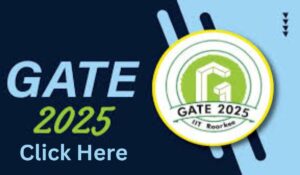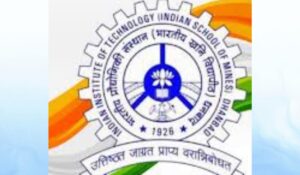GATE Syllabus 2025: The Indian Institute of Technology (IIT) Roorkee is scheduled to administer the GATE 2025 Examination on the 1st, 2nd, 15th, and 16th of February 2025. This examination serves as a gateway for students seeking admission to postgraduate programs such as Master of Engineering (ME), Master of Technology (M. Tech), and Doctor of Philosophy (Ph.D.) at prestigious institutions across India. Additionally, the GATE score is utilized by Public Sector Undertakings (PSUs) for recruitment in various roles, including Engineer Trainee, Management Trainee, and other positions in diverse sectors.
GATE Syllabus 2025
IIT Roorkee has made the official GATE syllabus for 2025 available on its website at gate2025.iitr.ac.in. This syllabus provides a comprehensive outline of the topics for each subject that will be assessed in the examination. Familiarity with the GATE 2025 syllabus is crucial for students to pinpoint essential topics for each section and comprehend the distribution of marks. A thorough understanding of the syllabus will significantly enhance students’ chances of achieving favourable results in the examination.
GATE Syllabus 2025
Candidates aspiring to excel in the GATE 2025 examination must possess a comprehensive understanding of the GATE syllabus for 2025. This knowledge is vital for identifying key topics and the relative weightage assigned to each section. To maximize their scores, candidates are encouraged to devise a study plan that aligns with the syllabus. IIT Roorkee has published the GATE Syllabus PDF for all disciplines on its official website. Those preparing for the GATE 2025 examination should access the complete syllabus through the direct link provided.

IITR GATE Syllabus 2025
IIT Roorkee (IITR) will oversee the GATE 2025 examination, which encompasses 30 subjects, including Mechanical, Civil, Electrical, Chemical, and Computer Science Engineering, among others. Candidates are advised to examine the GATE 2025 syllabus to gain insight into the significant and challenging topics. The examination will consist of 65 questions, covering General Aptitude, Engineering Mathematics, and specific technical subjects. For a detailed syllabus, please visit the official website at gate2025.iitr.ac.in. This resource will assist candidates in their preparation and help them strive for high scores.
GATE Syllabus 2025 – Overview
The GATE syllabus for 2025 is now accessible in PDF format for the convenience of applicants. This document encompasses all the topics and sub-topics that will be included in the examination. Test takers should download the GATE Syllabus PDF to initiate their preparation.
| GATE Syllabus 2025 | |
| GATE Full Form | Graduate Aptitude Test for Engineering (GATE) |
| GATE Conducting Authority | Indian Institute of Technology Roorkee |
| GATE 2025 Total No. of Papers | 30 (Data Science & Artificial Intelligence added) |
| GATE 2025 Starting Date of Application | 28 August 2024 |
| GATE 2025 Last Date of Application(without late fees) | 3rd October 2024 |
| Mode of Exam | Computer Based Test (CBT) |
| Number of Questions Asked | 65 |
| GATE 2025 Marks Distribution | 100 Marks[ 15 General Aptitude + 85 Subject Questions] |
| GATE Exam Language | English |
| GATE 2025 Marking Scheme | One Mark and Two Marks |
| GATE 2025 Syllabus | Available Now |
| Negative Marking | Yes (for MCQ & MSQ) |
| GATE 2025 Syllabus Official Website | www.gate.iitr.ac.in |
- READ MORE-SSC GD Admit Card 2025 Out for 4 February, Click Here To Download Link
GATE Syllabus: PDF
Candidates gearing up for the GATE examination can commence their studies by obtaining the GATE syllabus PDF. This resource enables them to organize their study plans effectively by categorizing the syllabus into subjects and chapters. Each subject’s syllabus is readily available for download. It is recommended that candidates aim to complete all topics in the GATE 2025 syllabus at least one month before the examination, allowing ample time for revision. A link to download the GATE syllabus PDF is provided below.
GATE Syllabus 2025 – Subject Wise
Prospective candidates preparing for the GATE 2025 Exam should concentrate on essential topics that are vital for success in the examination. Achieving a thorough understanding and proficiency in these subject-specific topics from the GATE Syllabus 2025 is essential for those aspiring to attain high scores in this year’s GATE Exam.
| GATE Subject Wise Syllabus Topics | |
| Discipline | Topics |
| General Aptitude (Common for all papers) | Verbal Ability Numerical Ability |
| Aerospace Engineering | Engineering Mathematics Flight Mechanics Space Dynamics Aerodynamics Structures Propulsion |
| Agricultural Engineering | Engineering Mathematics Farm Machinery Farm Power Soil and Water Conservation Engineering Irrigation and Drainage Engineering Agricultural Process Engineering Dairy and Food Engineering |
| Architecture and Planning | Architecture, Planning, and Design Construction and Management Environmental Planning and Design Urban Design, Landscape, and Conservation Planning Process Housing Services and Infrastructure Architecture Planning |
| Biomedical Engineering | Engineering Mathematics Electrical Circuits Signals and Systems Analog and Digital Electronics Measurements and Control Systems Sensors and Bioinstrumentation Human Anatomy and Physiology Medical Imaging Systems Biomechanics Biomaterials |
| Biotechnology | Engineering Mathematics General Biology Genetics, Cellular, and Molecular Biology Fundamentals of Biological Engineering Bioprocess Engineering and Process Biotechnology Plant, Animal, and Microbial Biotechnology Recombinant DNA Technology and Other Tools in Biotechnology |
Subject Wise
| Civil Engineering | Engineering Mathematics Structural Engineering Geotechnical Engineering Water Resources Engineering Environmental Engineering Transportation Engineering Geomatics Engineering |
| Chemical Engineering | Engineering Mathematics Process Calculations and Thermodynamics Fluid Mechanics and Mechanical Operations Heat Transfer Mass Transfer Chemical Reaction Engineering Instrumentation and Process Control Plant Design and Economics Chemical Technology |
| Computer Science and Information Technology | Engineering Mathematics Digital Logic Computer Organization and Architecture Programming and Data Structures Algorithms Theory of Computation Compiler Design Operating System Databases Computer Networks |
| Chemistry | Physical Chemistry Inorganic Chemistry Organic Chemistry |
| Electronics and Communications Engineering | Engineering Mathematics Networks, Signals, and Systems Electronic Devices Analog Circuits Digital Circuits Control Systems Communications Electromagnetics |
| Electrical Engineering | Engineering Mathematics Electric circuits Electromagnetic Fields Signals and Systems Electrical Machines Power Systems Control Systems Electrical and Electronic Measurements Analog and Digital Electronics Power Electronics |
| Environmental Science and Engineering | Mathematics Foundation Environmental Chemistry Environmental Microbiology Water Resources and Environmental Hydraulics Water & Wastewater Treatment and Management Air and Noise Pollution Solid and Hazardous Waste Management Global and Regional Environmental Issues Environmental Management and Sustainable Development |
| Ecology and Evolution | Ecology Evolution Mathematics and Quantitative Ecology Behavioral Ecology Applied Ecology & Evolution |
| Geomatics Engineering | Engineering Mathematics and Basic Geomatics Surveying and Mapping Image Processing and Analysis |
| Geology and Geophysics | Common Section Geology Geophysics |
| Instrumentation Engineering | Engineering Mathematics Electricity and Magnetism Electrical Circuits and Machines Signals and Systems Control Systems Analog Electronics Digital Electronics Measurements Sensors and Industrial Instrumentation Communication and Optical Instrumentation |
| Mathematics | Calculus Linear Algebra Complex Analysis Differential Equation Topology and Linear Programming |
GATE Syllabus 2025 – Subject Wise
| Mechanical Engineering | Engineering Mathematics Applied Mechanics and Design Fluid Mechanics and Thermal Sciences |
| Mining Engineering | Engineering Mathematics Mining Geology, Mine Development, and Surveying Geomechanics and Ground Control Mining Methods and Machinery Surface Environment, Mine Ventilation, and Underground Hazards Mineral Economics, Mine Planning, Systems Engineering |
| Metallurgical Engineering | Engineering Mathematics Metallurgical Thermodynamics Transport Phenomena and Rate Processes Mineral Processing and Extractive Metallurgy Physical Metallurgy Mechanical Metallurgy Manufacturing Processes |
| Naval Architecture and Marine Engineering | Engineering Mathematics Applied Mechanics and Structures Fluid Mechanics and Marine Hydrodynamics Naval Architecture and Ocean Engineering Thermodynamics and Marine Engineering |
| Physics | Mathematical Physics Classical Mechanics Electromagnetic Theory Quantum Mechanics Thermodynamics and Statistical Physics Atomic and Molecular Physics Solid State Physics Electronics Nuclear and Particle Physics |
| Production and Industrial Engineering | Engineering Mathematics General Engineering Manufacturing Processes I Manufacturing Processes II Quality and Reliability Industrial Engineering Operations Research and Operations Management |
| Petroleum Engineering | Linear Algebra Calculus Differential Equations Complex Variables Probability and Statistics Numerical Methods Petroleum Exploration Oil and Gas Well Drilling Technology Reservoir Engineering Petroleum Production Operations Offshore Drilling and Production Practices Petroleum Formation Evaluation Oil and Gas Well Testing Health Safety and Environment in the Petroleum Industry Enhanced Oil Recovery Techniques Latest trends in Petroleum Engineering |
| Textile Engineering and Fibre Science | Engineering Mathematics Textile Fibre Yarn Manufacture, Yarn Structure, and Properties Fabric Manufacture, Structure, and Properties Chemical Processing |
| Statistics | Calculus Matrix Theory Probability Standard Discrete and Continuous Univariate Distributions Stochastic Processes Estimation Testing of Hypotheses Non-parametric Statistics Multivariate Analysis Regression Analysis |
General Aptitude Syllabus
In the GATE Exam, 15 marks are allocated to the General Aptitude Section, which includes questions related to reasoning, quantitative aptitude, and English. Candidates can download the GATE General Aptitude Syllabus 2025 via the link provided below.
GATE Latest Syllabus
The GATE 2025 syllabus has been updated by IIT Roorkee to include a new subject, Data Science & Artificial Intelligence, which encompasses 30 areas of Engineering and Science. This revised syllabus emphasizes the key topics that candidates should prioritize to excel in the examination. It is crucial to understand that the Graduate Aptitude Test for Engineering Exam 2025 will be solely based on the GATE New Syllabus. Consequently, engineering graduates and third-year students should familiarize themselves with the GATE Latest Syllabus, which includes fields such as Data Science & Artificial Intelligence, Civil, Electrical, Mechanical, and others.
GATE Syllabus 2025: Branch Wise PDF
Candidates are required to possess a comprehensive understanding of the GATE syllabus to formulate an effective preparation strategy. The syllabus encompasses 30 distinct disciplines relevant to the GATE examination, with each discipline having its specific syllabus as outlined by the governing authorities. Candidates can access the GATE syllabus for 2025 by downloading it from the link provided below.
GATE Exam
Familiarizing oneself with the GATE Exam Pattern for 2025 is a crucial initial step before commencing preparation. The examination will consist of 65 questions presented in various formats, including Multiple-Choice Questions (MCQs), Multiple Selected Questions (MSQs), and Numerical Answer Types (NATs). This diverse format allows for a comprehensive assessment of candidates’ knowledge and problem-solving skills. With a dedicated time allocation of 3 hours, candidates will systematically approach these questions, ensuring a structured and focused examination strategy.
GATE Exam Pattern
In the GATE 2024 Exam, all questions will carry either 1 mark or 2 marks, culminating in a total of 100 marks. Eligible candidates are encouraged to review the GATE Exam Pattern for 2025 to gain a concise understanding of the examination, including the number of questions and total marks, as detailed below:
| GATE Exam Pattern | |
| Particulars | Details |
| GATE 2025 Mode of Examination | Computer-Based Test (CBT) |
| GATE 2025 Total Time Duration | 3 hours (180 minutes) |
| GATE 2025 Total Number of Subjects (Papers) | 30 |
| GATE 2025 Exam Sections | General Aptitude (GA)Candidate’s Specified Discipline |
| GATE 2025 Type of Questions | Multiple Choice Questions (MCQ)Multiple Select Questions (MSQ)Numerical Answer Type (NAT) Questions |
| GATE 2025 Number of Questions | 10 (GA) + 55 (subject) = 65 Questions |
| GATE 2025 Distribution of Marks in all Papers except papers AR, CY, DA, EY, GG, MA, PH, ST, XH and XL | General Aptitude: 15 Marks Engineering Mathematics: 13 Marks Subject Questions: 72 Marks Total: 100 Marks |
| GATE 2025 Distribution of Marks in papers AR, CY, DA, EY, GG, MA, PH, ST, XH and XL | General Aptitude: 15 Marks Subject Questions: 85 Marks Total: 100 Marks |
| GATE 2025 Marking Scheme | Questions carry 1 mark and 2 marks. |
| GATE 2025 Negative Marking | For the wrong answers chosen in MCQs, there will be NO negative marking. For 1-mark MCQ, 1/3 mark will be deducted for a wrong answer. For 2-mark MCQ, 2/3 mark will be deducted for a wrong answer NAT-type questions, there will be NO negative marking. There is no partial marking in MSQ. |
GATE Syllabus-Based Preparation Tips
The GATE Syllabus for 2025 is extensive, necessitating a robust strategy for candidates intending to take the exam to ensure comprehensive coverage of all essential topics within their subjects.
Here are several effective GATE preparation tips that have been utilized by successful candidates:
- Initiate your GATE preparation by thoroughly reviewing the syllabus, which will assist in identifying key topics and organizing your study schedule.
- Familiarize yourself with the GATE 2025 exam pattern to understand the structure of the question paper and the associated time constraints.
- Engage in daily GATE 2025 mock tests to enhance your time management capabilities.
- Utilize reputable GATE textbooks and online courses to deepen your understanding of complex subjects.
- Attempt as many previous years’ GATE question papers as possible to gain insight into the examination format and recognize frequently tested topics.





